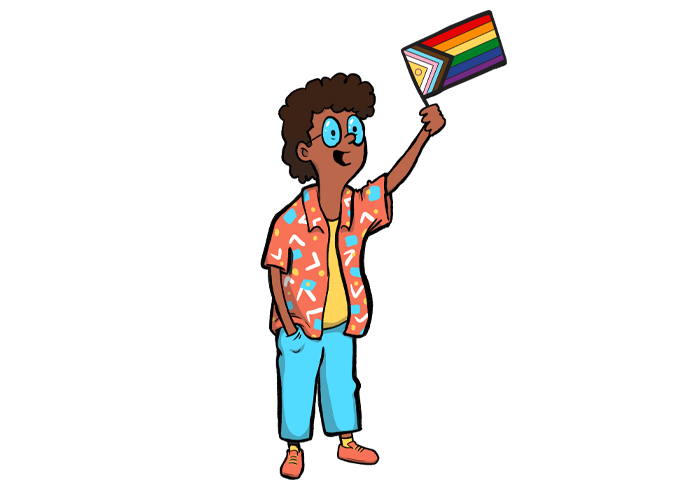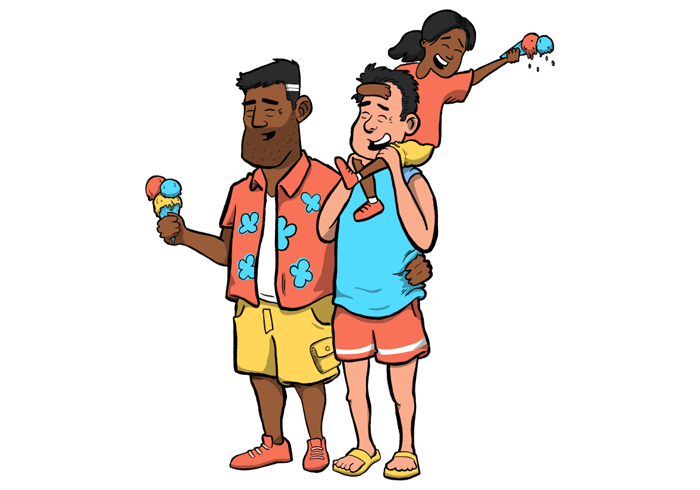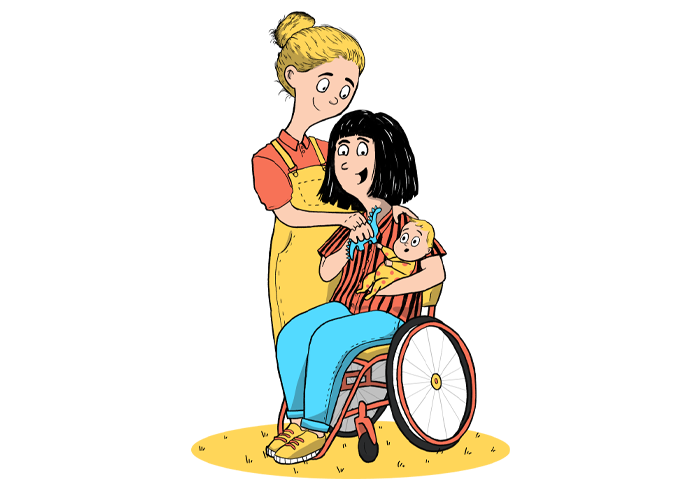LGBT+ children and schools

There are LGBT+ children in all schools and they are a diverse group, just like other children. However, LGBT+ children have in common the fact that they are outside the so-called norm in terms of sexual orientation, gender expression, sex characteristics, and/or gender identity.
The National Curriculum, gender equality legislation, and Reykjavík City’s Human Rights Policy require schools to consider and teach about LGBT+ people and issues. This page has material that will hopefully make that task easier for schools.
LGBT+ friendly schools
Schools that want to be LGBT+ friendly can use the checklist below, which is divided into three sections: students, teachers, and the school.
All schools can benefit from the checklist regardless of school level, but some aspects are more relevant to older children than younger ones and vice versa.
Information and guidelines have also been compiled for schools on non-gender-segregated birthdays and birthday groups.

LGBT+ youth center
Tjörnin's LGBT+ youth center is for all young people in grades 8 to 10 who identify as LGBT+ or have another connection with LGBT+ issues. The youth center is located at Spennistöðin by Austurbæjarskóli and is open every Tuesday evening from 7:30pm to 10pm. Social activities are also available for 10 to 12 year old LGBT+ children and children who have another connection with LGBT+ issues. The director of the youth center is Hrefna Þórarinsdóttir. You can contact Hrefna via email hrefna.thorarinsdottir@rvkfri.is or phone at 6908904.
Samtökin '78 also have a group for LGBT+ youth aged 16 and over in their premises. You can get more information from Hrefna or Samtökin '78.
LGBT+ education material
Here is a list of LGBT+ education material including books, articles, videos, and more, covering LGBT+ issues, including transgender child and adult issues. Each item has a brief description of the content as well as its language, as well as who it might be appropriate for. When using material for children, it is good to use it as a starting point for discussions.
You can also check out the 2021 Gender and LGBT+ Education Material Report, which groups content by school level.
LGBT+ families
It is important to understand that parents, guardians, and student families may be LGBT+. A number of factors need to be considered to ensure that LGBT+ families are included and feel welcomed and expected, and also so that students do not experience exclusion or divergence for having a LGBT+ family. It’s important to consider how families are addressed, whose perspectives are assumed on forms, how they are invited to participate in schooling, and how families are spoken of in the classroom, etc.
Just as with LGBT+ students, it is worth asking yourself: "How do LGBT+ parents and families know they're welcome and can find a supportive environment here?" School staff may have children, parents, siblings, or other family members who are LGBT+, so it's important to ensure LGBT+ friendly language.

Well-being of LGBT+ children and youth
We live in a society where heterosexuality and cisgender (not being trans) are the norms. Therefore, LGBT+ people are at greater risk of exclusion, discrimination, prejudice, bullying, and other forms of violence.
This manifests itself widely and not least within the school system, where children spend a large amount of time and are heavily influenced, which is confirmed by a survey of the way LGBT+ youth feel in the Icelandic school environment.
The well-being and circumstances of LGBT+ children and youth in schools
Icelandic and foreign research shows that LGBT+ students often feel worse in schools than others, and that teaching methods, teaching materials, and the discourse are often exclusionary and even degrading towards LGBT+ people. It often seems that silence and embarrassment prevail around queerness, and children often hear LGBT+ terms used in negative terms before learning what the terms really mean.
A recent survey of the experience of LGBT+ youth in Icelandic schools showed the significant positive influence supportive teachers and diverse teaching materials and discussions (based on LGBT+ issues) can have.
More information, education, and advice
The following parties can offer consultation, various LGBT+ education, and advice.
- You can apply for LGBT+ education from the Human Rights & Democracy Office, which can be tailored to the needs of each workplace. You can also apply for Rainbow Certification by contacting hinsegin@reykjavik.is. We also provide advice and support on LGBT+ issues.
- The Equality School provides support and advice, as well as education, on equality issues in both Reykjavík City schools and after-school programs. Project managers for the Equality School are Maríanna Guðbergsdóttir marianna.gudbergsdottir@reykjavik.is and Indíana Rós Ægisdóttir indiana.ros.aegisdottir@reykjavik.is
- Samtökin '78 have an agreement with Reykjavík City and provide training to students on LGBT+ issues and people in Reykjavík City schools free of charge. The association also offers counseling for LGBT+ children/people and their immediate family at no cost. You can sign up for education on the website of Samtokin '78
- Samtökin '78 and Tjörnin run an LGBT+ youth center for all young people aged 13 to 18 who identify as LGBT+ or have another connection with LGBT+ issues. The youth center is open every Tuesday evening from 7:30pm to 10pm. The director of the youth center is Hrefna Þórarinsdóttir. The director can be contacted via email at hrefna.thorarinsdottir@rvkfri.is or by phone at 6908904.
What do you want to explore next?
- School Obligations Equality education should take place at all levels of school.
- Gender Equality Academy A platform for sharing knowledge on equality issues with the staff of preschools, primary schools and after-school programs.
- Trans children and schools Trans children now come out both younger and to a greater extent than before.
- LGBT+ education material Do you want advice on LGBT+ issues?
- Well-being of LGBT+ children and youth How are our children feeling?
- Definitions LGBT+ is an umbrella term for those who fall outside of what is considered the norm.
- Definitions and status of trans children It is important to recognize the gender identity of trans children.
- LGBT+ issues What is Reykjavík City doing on LGBT+ issues?